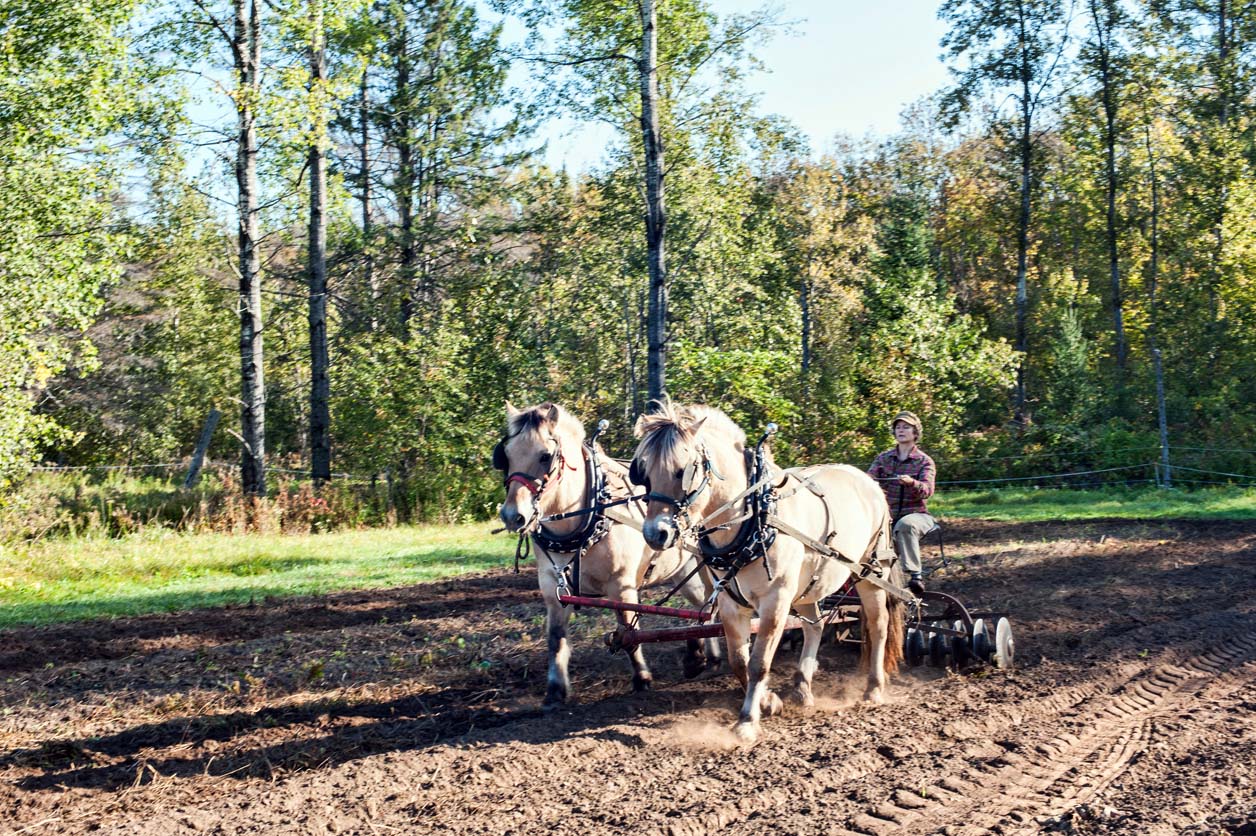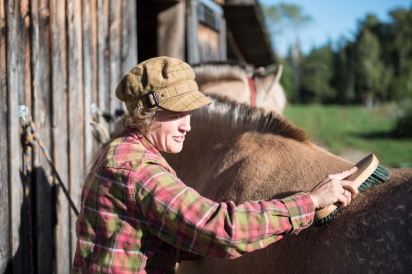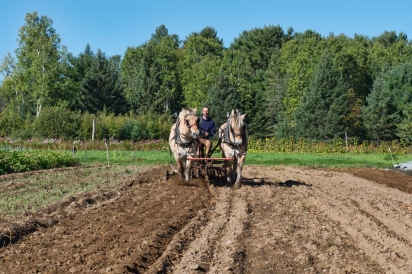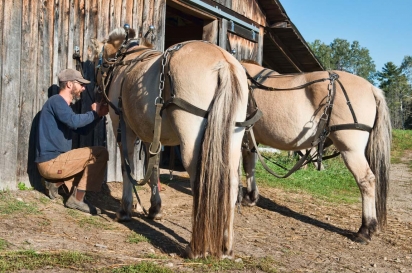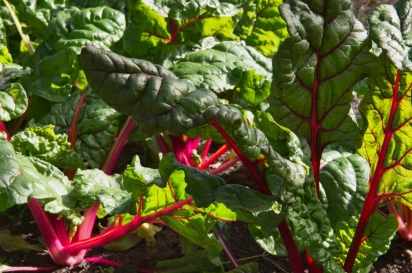Farming by Horsepower
Successful small-scale, organic farming resembles a game of chess. It’s strategic, there’s a great deal of planning and it moves very slowly. “In fact,” says Charlotte Scott, co-owner with her husband Richard Williams of Ferme Lève-Tôt near Low, Québec, “it’s like a game of 4-d Tetris, planning through time on a 10-month cycle.”
Buried deep in rural Québec, down tree-lined, unpaved roads used mostly by summer cottage traffic, Williams and Scott have divided their 20 acres of land into 12 sections, which are used for production on a four-year rotation. They also have 400 feet of greenhouses, which must be moved around the property to access fertile soil. When a section is lying fallow, it will be planted up with buckwheat, oats, rye or white clover, to re-infuse the soil with nutrients.
This system allows the couple to fulfill orders for 110 community supported agriculture (CSA) baskets over a 20-week season, and host a stall, groaning with produce, at the weekly Wakefield farmers’ market, without depleting the soil. Each CSA basket will feed a family of four and comes with recipe ideas, especially for some of the more exotic vegetables such as Daikon radish and giant kohlrabi.
Keeping nature, production demands and the capacity for the land in balance is a daily challenge for any farmer and this couple is no exception. “We have sandy soil and only so many warm months,” Williams explains. “And this year (2016 season) has been particularly difficult due to the drought in spring and early summer.”
Nonetheless, there are rows upon rows of tomatoes, warm and mouth-watering in the sunshine. Emmett, the couple’s sevenyear- old son, gobbles them by the handful, carefully choosing his favourite orange and brown varieties. Nearby peppers thrive — purple, red, yellow — as do the eggplant, basil, cilantro, celeriac, cosmos flowers, beans, swiss chard and hot peppers, to name just a few of the good things growing within a stone’s throw of one another.
Scott and Williams met at a community radio station while at university in Montreal and they began volunteering in community gardens. “The city’s farmers’ markets were the gateway drugs to becoming farmers ourselves,” Scott jokes. In 2007, Williams did a co-op on a farm outside Montreal and the rest is history.
In 2010, they launched themselves as farmers and began offering CSA shares — 50 of them — from rented land to the east of Ottawa. Scott worked with Emmett, their infant son, strapped to her back. Just one year later, they bought Ferme Lève-Tôt, from local farmers Juniper Turgeon and Alex MacKay-Smith, who moved their operation about 10 kilometres away as the crow flies, towards Wakefield. The land was already organically certified and boasted a large walk-in cooler to store the harvest.
To maintain their organic status, among many other rules such as no fungicides nor pesticides, the couple is obliged to purchase organic seeds if they exist, but if not, they can use non-organic seeds to diversify the produce they offer. “We are always trying new things,” Scott says, “and we belong to a vast network of 200 or so small farms across Québec. We are share information on what grows well and what doesn’t.”
The couple feels as though it is part of the new farming revolution — one cited in a 2013 study by the U.N. Commission on Trade and Development: Wake up Before It’s Too Late. The report asserts that major changes are needed in our food agriculture and trade systems, with a shift towards local, small-scale farmers and local food distribution networks.
They have also recently purchased a pair of half-brother, Mennonite- trained Norwegian Fjord horses to work on the farm. This isn’t due to any particular desire to farm in a more authentic way, nor thanks to nostalgia for pre-industrial farming days. “We are pretty pragmatic people and find the use of animal power to be fairly pragmatic. We are reducing our reliance on fossil fuels, the horses are easier on the soil and cause minimal compaction, generate fertility, start in all weather, never get stuck and can be scaled for the job by using one or both of them (or more),” Williams says. “It's also fun and rewarding.”
“We are moving forward, not backwards,” adds Scott. “We don’t pretend we can turn our backs on technology, but modern market farming uses too much technology.”
The couple does own a tractor — invaluable for tasks where horsepower just doesn’t cut it. Williams concedes, “there are jobs that are clearly much more efficient, safer and pleasant with a tractor and we expect to always have a mixed-power system.” “But our spirits are lifted working with horses. Farming is hard work — any way to make it more beautiful, is fun,” adds Scott. “When you’re working with horses you have to be very present in the moment.”
The future is bright. The days will be longer and the morning starts earlier for Ferme Lève-Tôt. This year, they’ll be moving a few miles down the road to a new, larger property, one currently owned by maple syrup producers Älska. They will also be celebrating their fifth year at the Wakefield market, which itself will be moving to a bigger site, at the community centre. In eight seasons, these hard-working folks will have more than doubled the size of their business and now also sell root vegetables and greenhouse greens through the shoulder seasons.
While the views will change, much will remain the same. The nightly frog chorus heard all over the Gatineau Hills, “which sounds like you’ve fallen down a black hole of peeping frogs,” says Scott, will no doubt continue to enchant them. And all their appreciative customers won’t be going away. “The high point for me is going to market and the CSA drop-offs,” says Williams. “I love talking to people who enjoy our vegetables. Knowing that it’s really worthwhile for them is important, as farming can be isolating.”
Ferme Lève-Tôt
460 Kalalla Rd., Alcove Qué.
fermelevetot.ca, 819.422.2329


